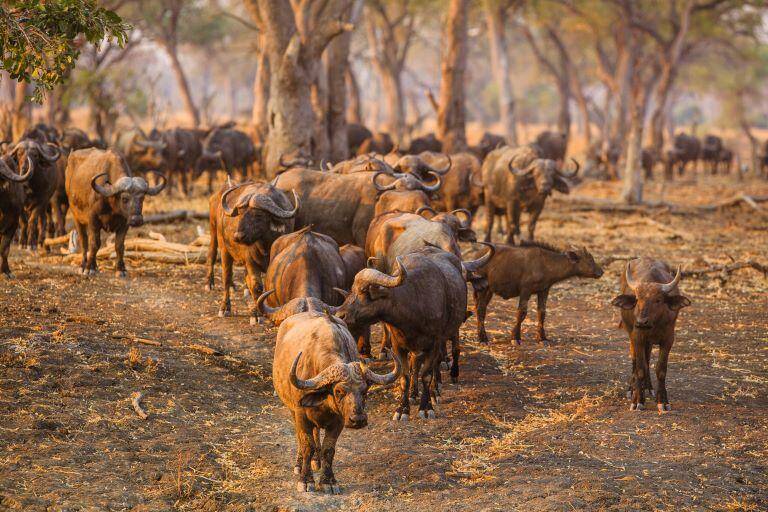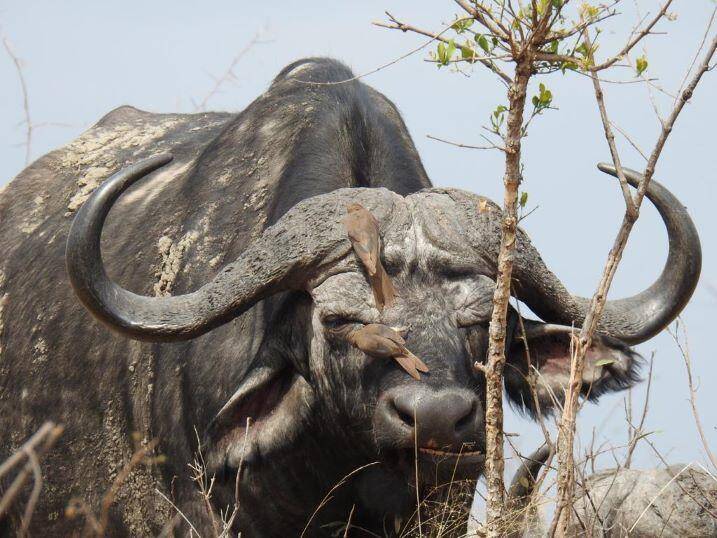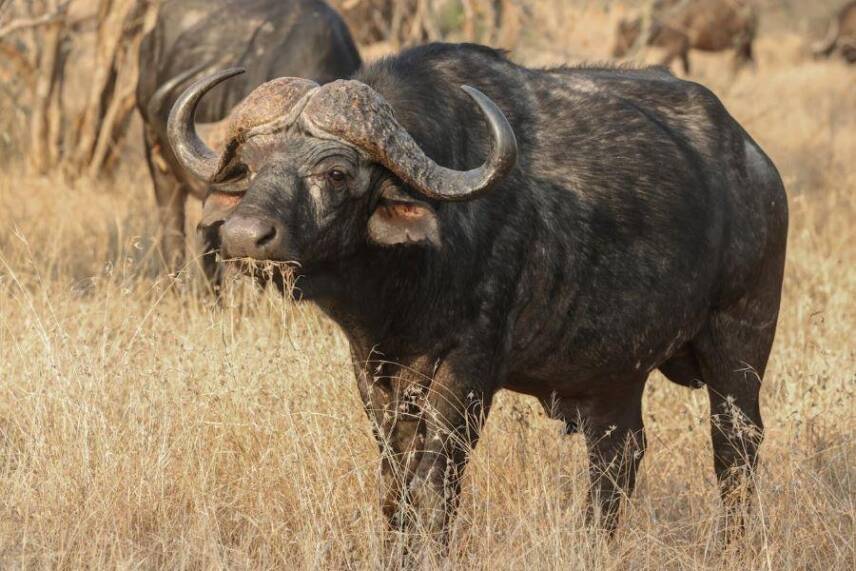When it comes to hunting Cape buffalo, South Africa and Zimbabwe stand out as prime destinations. Known as Africa’s “Black Death” or “Widowmaker,” the Cape buffalo is not only a prized trophy but also a formidable challenge. It’s considered the most dangerous of the Big Five, making the hunt an adrenaline-pumping experience.
In South Africa and Zimbabwe, Cape buffalo hunts are allowed year-round, offering ample opportunities for hunters. Tracking these majestic animals from water holes or along the roads adds to the thrill. With their aggressive nature and herd-protective instincts, facing a Cape buffalo requires both skill and courage. Let’s explore why these regions are the best places to embark on this unforgettable adventure.
[DYNAMIC-BLOGTABLEOFCONTENT]
Key Takeaways
- Prime Hunting Destinations: South Africa and Zimbabwe are top destinations for hunting Cape buffalo, offering year-round opportunities and well-managed game reserves.
- Cape Buffalo Characteristics: Known for their aggressive nature and protective herd instincts, Cape buffalo are considered the most dangerous of the Big Five, providing a thrilling challenge for hunters.
- Essential Equipment: A minimum .375 caliber rifle is required for Cape buffalo hunts, with higher calibers recommended. Proper gear is essential for a successful hunt.
- Optimal Hunting Seasons: The best time for hunting Cape buffalo is during the dry autumn months when water sources are scarce, making buffalo easier to track.
- Guidance and Safety: Experienced guides are crucial for navigating the terrain, understanding animal behavior, and ensuring safety during the hunt.
- Ethical Practices: Hunters are encouraged to follow ethical practices, including respecting wildlife regulations and contributing to conservation efforts for sustainable hunting.
Understanding Cape Buffalo
The Cape buffalo, also known as the African buffalo (Syncerus caffer), holds a unique place in Africa big game hunts due to its size, strength, and aggressive nature. Nicknamed “Black Death” and “Widowmaker,” this animal doesn’t earn these titles lightly. As one of the Big Five, it’s considered the most dangerous game to hunt.
Physical Characteristics
Cape buffalo are imposing creatures. Adult buffalo measure between 6-11 feet in length and stand 3-5 feet at the shoulder. They can weigh up to 2,000 pounds. They have a pronounced shoulder hump, massive head, broad chest, and short, sturdy legs. Their dark brown to black coats, large curved horns, droopy ears, and black noses make them easily recognizable.

Behavior and Habitat
Cape buffalo are known for their highly protective nature. They often travel in herds and will defend their group at all costs. Their aggressive behavior makes hunting trips in Africa a thrilling experience. They’re commonly found in savannas, floodplains, and forests across South Africa and Zimbabwe, where African hunting safari enthusiasts pursue them year-round.
Hunting Equipment
For African cape buffalo hunts, a .375 caliber rifle shooting a 300-grain bullet is the minimum legal requirement. Using higher calibers such as .416 Ruger, .404 Jeffery, .458 Winchester Magnum, or Lott cartridges increases the likelihood of a successful hunt. In close quarters, double rifles like the .470 Nitro Express and .500 Nitro Express are favored.
Hunting Methods
When on an African hunt, trackers often locate buffalo near waterholes or roads. The hunt is a mix of strategy and courage, requiring skill and patience. Experienced guides and trackers help hunters navigate the terrain and identify prime hunting spots.
Challenges and Rewards
Facing a Cape buffalo tests one’s nerve and skill. As the most dangerous member of the Big Five, overcoming the animal’s aggressive stance and protective instincts adds immense value to the hunting adventure. The reward of successfully capturing such a formidable creature earns respect and a sense of achievement
Exploring more details about Cape buffalo and other exciting game, visit Game Hunting Safaris.
Top Countries for Cape Buffalo Hunting
When it comes to experiencing the thrill of Cape buffalo hunts, a few countries stand out as premier destinations. Let’s explore the top picks for an unforgettable African hunting safari.
South Africa
South Africa is often the first choice for African cape buffalo hunts. This country offers well-managed game reserves and professional hunting guides. Hunters here can find large herds in areas like the Limpopo and Mpumalanga provinces. The presence of well-equipped lodges and experienced outfitters makes hunting in South Africa a top preference. We should note the meticulous conservation efforts taken to ensure the sustainability of Cape buffalo populations.
Tanzania
Tanzania is another prime location for Cape buffalo hunts, offering expansive wilderness areas and diverse landscapes. The Selous Game Reserve and the Serengeti are renowned for their abundant buffalo herds. Tanzania’s regulation and management of hunting contribute to the longevity of its wildlife and resources. This country’s vast and varied terrain provides hunters with unique challenges and experiences. Whether near Lake Manyara or in the dense Miombo woodlands, Africa big game hunts in Tanzania are unparalleled.
Zimbabwe
Zimbabwe boasts exceptional opportunities for hunting trips in Africa, with Cape buffalo populations thriving in areas like Hwange National Park and the Zambezi Valley. Zimbabwe’s parks, frequented by experienced hunters, maintain a balance between adventure and conservation. The local guides’ expertise and intimate knowledge of the terrain enhance the hunting experience. Moreover, Zimbabwe’s hunting regulations ensure ethical practices and the preservation of its diverse wildlife.
For more information on organizing your hunting trip, visit Game Hunting Safaris.
Hunting in Africa offers an unparalleled adventure, drawing enthusiasts from around the globe. Whether it’s the thrill of facing off against a Cape buffalo or the allure of diverse landscapes, game hunting safaris promise a memorable experience. Buckle up as we take you through the essentials of planning, executing, and relishing an African hunting safari.

Key Considerations for Choosing a Hunting Location
When selecting the perfect venue for Cape buffalo hunts or other big game, several factors come into play to ensure a successful and ethical hunt.
Terrain and Environment
Selecting a suitable terrain is crucial for a successful hunt. In Africa, the environment varies significantly between regions. South Africa offers semi-arid bushveld and savannah, while Zimbabwe and Tanzania feature dense forests and swampy lowlands. These diverse terrains demand different strategies and equipment. For instance, navigating thick brush requires machetes and sturdy boots, whereas swampy regions necessitate waterproof gear. Understanding the terrain helps us anticipate the challenges and adapt our hunting tactics accordingly.
Hunting Regulations and Permits
Africa’s vast game reserves operate under strict regulatory frameworks to protect wildlife and ensure ethical hunting practices. Before embarking on our African hunting safari, we must secure the necessary permits and familiarize ourselves with local regulations. Permits vary by country and game type, often requiring hunters to demonstrate their skill levels and safety proficiency. Non-compliance can lead to hefty fines and legal issues, underscoring the importance of thorough preparation. For detailed regulation insights, visit https://gamehuntingsafaris.com.
Guide Expertise and Safety
Expertise from experienced guides is indispensable when hunting African big game. Guides possess invaluable knowledge of animal behavior, migration patterns, and local geography, significantly enhancing our hunting success. Additionally, safety cannot be overstated. Against formidable game like Cape buffalo, guides provide crucial safety instructions and emergency protocols, ensuring that we enjoy a safe and rewarding experience. Engaging a reputable African hunting safari broker can also connect us with the best guides in the region.
Planning Your African Hunting Safari
Planning a hunting trip in Africa involves several critical steps. By methodically addressing each aspect, we ensure a seamless and productive safari.
Selecting the Right Game
Different regions in Africa offer varied big game species. South African game hunting safaris might focus on Cape buffalo, kudu, and impala. In contrast, Tanzania might present opportunities to hunt elephants, lions, and buffalo. We should research the available game in our chosen location and tailor our hunting preferences accordingly. This specificity aligns our expectations with the region’s offerings, enhancing our overall experience.
Gear and Equipment
Proper gear is essential for any successful hunt. Basic gear includes rifles, binoculars, knives, and appropriate clothing for the terrain. In the case of Cape buffalo hunts, we require high-caliber rifles, at least .375 H&H or higher, for effective takedown. We should also consider tripods or shooting sticks for stability, especially in uneven terrains. Quality gear ensures efficiency and safety, turning potential challenges into manageable tasks.
Travel and Accommodation
Organizing travel and accommodation is a fundamental part of safari planning. Many hunting destinations in Africa offer dedicated lodges equipped with amenities tailored to hunters’ needs. We should review accommodation options, considering factors like proximity to hunting zones, on-site guides, and the presence of necessary facilities. Additionally, addressing travel vaccinations and entry requirements for the chosen country is indispensable. Proper planning transforms logistical challenges into smooth transitions.
Practical Tips for a Successful Hunt
Drawing from the expertise of seasoned hunters, here are some practical tips to maximize our hunting success.
Understanding Animal Behavior
Knowledge of animal behavior significantly boosts our success rates. Cape buffalo, for example, are known for their acute senses and unpredictable nature. Observing herd movements, wind direction, and recognizing alarm signals can make or break our hunt. Patience and keen observation often result in lucrative insights and strategic advantages.
Physical Preparedness
Hunting in African terrains can be demanding, requiring optimal physical fitness. Regular exercise focusing on endurance, strength, and flexibility prepares us for the long treks, sudden chases, and physically taxing conditions. Adequate physical preparation ensures we maintain peak performance throughout our hunting endeavors.
Ethical Hunting Practices
Upholding ethical hunting practices is non-negotiable. This involves respecting local wildlife regulations, ensuring clean and humane kills, and contributing to conservation efforts. Ethical hunters enhance the sustainability of game reserves and foster positive relationships with local communities. In essence, our responsible actions today preserve hunting opportunities for future generations.
An African hunting safari offers not just a hunt but an adventure steeped in tradition, challenge, and respect for nature. Careful planning, adherence to ethical practices, and leveraging expert guidance transform this experience into an unforgettable journey.
The Ideal Time for Cape Buffalo Hunting
The best period for Cape buffalo hunts is during the drier autumn months. When the grass is shorter and water sources become scarce, it makes tracking and spotting buffalo easier. In South Africa and Zimbabwe, African cape buffalo hunts can take place all year round, but autumn provides optimal conditions. During these months, buffalo often gather around the remaining water sources, increasing the chances of a successful African hunting safari.
Why is autumn particularly favorable? It’s because the dry conditions cause buffalo to move more predictably. As they seek out water, their grazing areas become concentrated, allowing hunters to strategize more effectively. This season also offers clearer visibility with the grass cut down and bush less dense, improving sightlines and safety during Africa big game hunts.
When planning hunting trips in Africa, especially for Cape buffalo, considering the time of year is crucial. The perfect alignment of climate and animal behavior during the autumn months enhances success rates. Experienced hunters understand that patience and timing are key, and the autumn season offers the ideal blend of both for a memorable and effective hunt. For a comprehensive guide, visit Game Hunting Safaris.
Personal Accounts and Experiences
When it comes to African cape buffalo hunts, personal accounts provide invaluable insights into what makes hunting trips in Africa so special. Hearing from those who’ve experienced the thrill first-hand can offer fresh perspectives and advice for aspiring hunters.
Memorable African Hunt Stories
We spoke with several seasoned hunters who shared their unforgettable experiences. One hunter recounted his journey on an African hunting safari in South Africa. He vividly described the heart-pounding moment when he first encountered a massive Cape buffalo. Standing just a few yards away, the buffalo’s sheer size and formidable presence tested his nerves and skills.
Another hunter narrated his adventures in the game-rich regions of Zimbabwe. Tracking a lone buffalo through dense bush, he emphasized the importance of patience and keen observation. His account highlighted how effective camouflage and silent movement are crucial in approaching these wary animals closely.
Lessons Learned from Cape Buffalo Hunts
Personal experiences aren’t just about thrilling tales; they offer practical lessons. For instance, a group of hunters on a safari in Tanzania discovered the significance of having an experienced guide who understands the local terrain and animal behavior. The guide’s knowledge made all the difference in locating and successfully hunting Cape buffalo.
A hunter from Namibia shared that the right gear can’t be underestimated. Proper clothing to blend into the surroundings, sturdy footwear, and reliable firearms are essential. He pointed out that investing in quality equipment enhances both safety and the overall hunting experience.
Tips from Veteran Hunters
- Preparation is Key:
Preparation involves more than physical readiness. It includes understanding buffalo behavior and habits. Hunters often stress the importance of studying up on the Cape buffalo’s daily patterns and preferred habitats. - Respect for Wildlife:
Respect for the animal is paramount. Hunters who’ve participated in various African hunts agree on maintaining ethical hunting practices. This respect fosters a balance between hunting for sport and contributing to conservation efforts. - Safety First:
Safety can’t be overemphasized. Buffalos are known for their unpredictable nature. Stories of hunters who’ve faced charging buffaloes underline the need for always being aware and ready to react quickly.
Reading personal accounts of Cape buffalo hunts provides both inspiration and practical advice. Learning from those who’ve walked the paths we aspire to follow helps us prepare for our own African hunting safari. Real-life experiences, whether they’re about an unexpected encounter or a well-planned hunt, enrich our understanding and appreciation of African big game hunts.
For more information, visit Game Hunting Safaris.
Conclusion
Hunting Cape buffalo is an exhilarating and rewarding pursuit that demands preparation and respect for the wildlife. South Africa, Zimbabwe, Tanzania, and Namibia each offer unique and unforgettable experiences for hunters. The thrill of the hunt, combined with the conservation efforts and guidance from seasoned professionals, makes these destinations prime choices for any serious hunter. As we embrace the adventure, let’s always prioritize safety and ethical hunting practices to preserve these majestic creatures for future generations.
Frequently Asked Questions
What makes Cape buffalo hunting in South Africa and Zimbabwe unique?
Hunting Cape buffalo in South Africa and Zimbabwe is unique due to the challenging nature of pursuing such a formidable animal and the well-managed game reserves in these regions. The local guides’ expertise and stringent hunting regulations ensure a thrilling yet responsible hunting experience.
What are the physical characteristics of Cape buffalo?
Cape buffalo are known for their massive size, dark coat, large curved horns, and solid build. They are considered one of the most dangerous game animals due to their unpredictable and aggressive nature.
What equipment is necessary for hunting Cape buffalo?
Essential equipment for hunting Cape buffalo includes a high-caliber rifle, sturdy scope, quality ammunition, and shooting sticks. Additionally, hunters should use robust clothing, good boots, and protection against the elements.
What hunting methods are preferred for Cape buffalo?
Preferred hunting methods for Cape buffalo include spot-and-stalk and ambush techniques. These methods demand patience, skill, and strategic planning to successfully harvest the game.
Which countries are top destinations for Cape buffalo hunting?
Top destinations for Cape buffalo hunting include South Africa, Zimbabwe, Tanzania, and Namibia. These countries offer well-managed game reserves and unique hunting experiences.
How do local guides contribute to the hunting experience?
Local guides enhance the hunting experience with their deep knowledge of the terrain, wildlife behavior, and hunting regulations. They ensure hunters have a safe and successful safari while promoting conservation efforts.
What role do hunting regulations play in Cape buffalo hunting?
Hunting regulations are crucial in maintaining a balance between adventure and conservation. They ensure the sustainable use of wildlife resources, protect ecosystems, and promote ethical hunting practices.
Can personal accounts from seasoned hunters provide valuable insights?
Yes, personal accounts from seasoned hunters offer inspiration and practical advice. These stories highlight the importance of preparation, respect for wildlife, and safety, enriching the overall understanding of African big game hunts.
